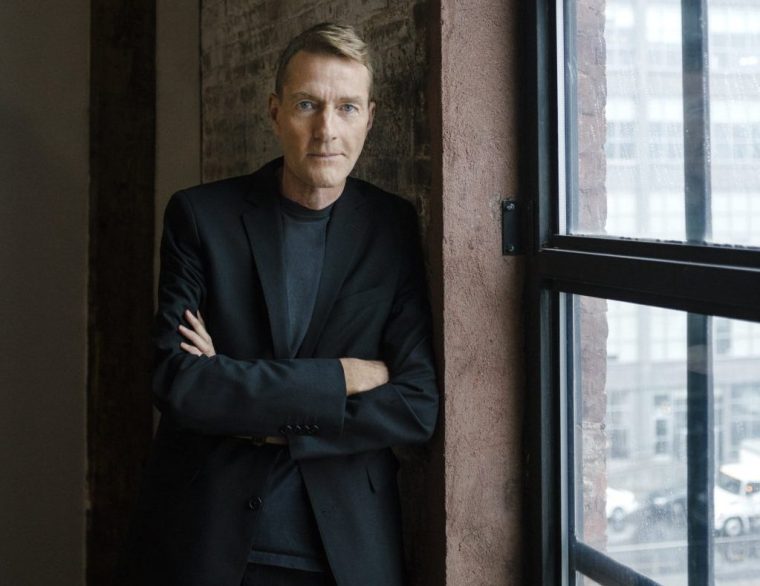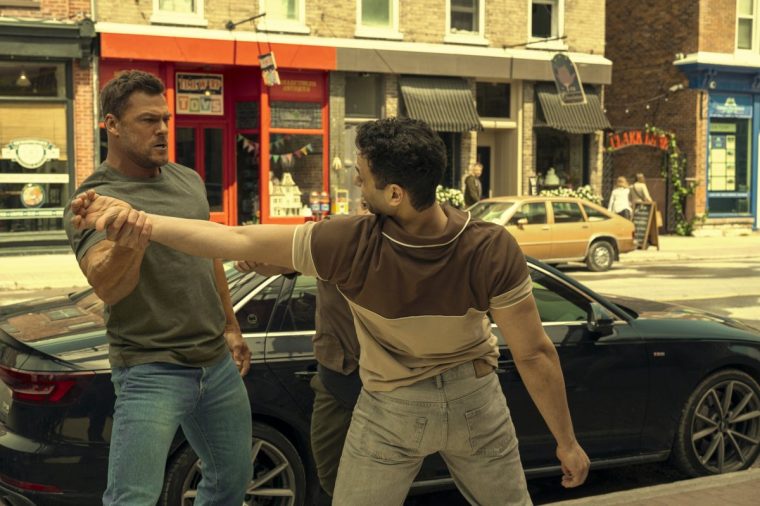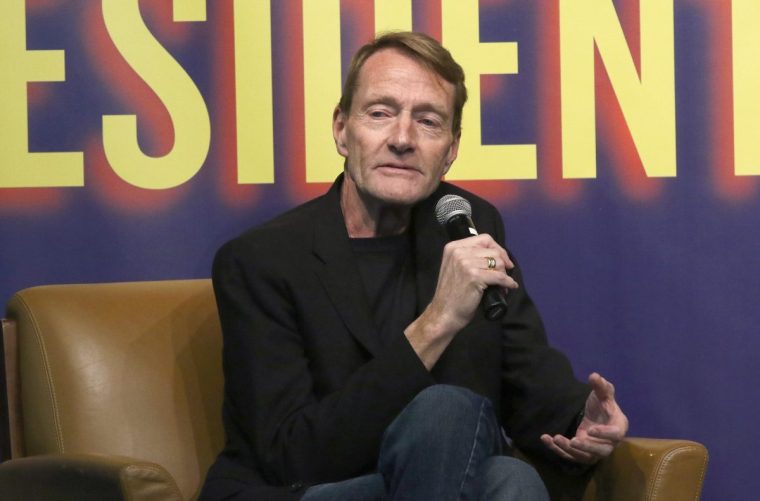When Lee Child collects me from a Lake District train station in his yellow Prius one sunny afternoon, I can’t miss him. Standing 6ft 4ins (one inch shorter than his creation Jack Reacher), the British author looks gaunt, rangy and resilient, like a rancher. He and his wife Jane do actually own a ranch in Wyoming, one of five US properties including a vast Manhattan brownstone they bought just last year, but he’s getting out fast. The day after Donald Trump won the presidential election, Child flew to the UK to buy a house.
“We misjudged it,” he says ruefully as we pull up to a country pub. It’s a shame he doesn’t narrate his audiobooks because his flinty mid-Atlantic voice would be perfect. “We thought that it was going to be OK in the US. And then it wasn’t. I love New York and I cherish the possibility of going back but how likely is that? I’m old now” – he’s 70 – “and it’s going to be many years before it’s repaired.” He shrugs. “It is what it is.”
So he’s returned to the Lake District, where he dreamt up Jack Reacher back in 1994. “It’s been a strange circular journey. I never expected to come back.” Lee Child was Jim Grant back then. After 20 successful years working for Granada Television, his job was doomed by impending cuts so he decided to start all over again as a novelist. “I had such energy,” he marvels. “Partly born out of desperation. It had to work.”
Child noticed that most long-running crime series were effectively soap operas, with a fixed location and supporting cast, so he made his hero an invincible vagabond who finds trouble in a new town each year. He wrote the first chapter in an hour and showed it to Jane. She liked it. He kept going. And going. Each book was more successful than the last. Child’s Reacher novels (24 on his own and five collaborations with his younger brother Andrew) have sold around 150 million copies around the world, not to mention the two movies and the smash-hit Amazon Prime TV series. I don’t argue when he offers to pay for lunch.
Child orders steak pie and mash and talks about his slow-motion retirement. He always hated it when he could sense his favourite authors phoning it in, so he decided to quit while he still cared, after 2019’s Blue Moon. There followed a five-year transition period during which he brainstormed ideas with Andrew but didn’t do the actual writing. Now he’s pulled back all together, although his name remains on the cover. He’s become a pure brand.

Child tells all in Reacher: The Stories Behind the Stories, a fascinating new collection of diaristic essays that he originally wrote as introductions to ultra-limited luxury editions of his books for wealthy collectors who probably wouldn’t read them. “I put in a lot of personal stuff that now is exposed to the world,” he says, “and I’m thinking, ‘Wow, should I really have done that? It feels intimate now.’”
Child is so briskly unpretentious that he downplays how interesting he is. The author John Lanchester once described Child’s modus operandi as “almost impossible-to-credit”. He would start writing on 1 September every year with a vague premise but no outline. Each day he would start work after lunch, fuelled by cigarettes and coffee (his record is 36 cups). He’d lie on the couch dreaming up the next plot development, then write five or six pages. Ninety working days later, he would have a perfectly plotted 500-page novel. He would then return to the sofa, smoke a joint, and read the manuscript just once, eliminating dead wood but never tweaking the story. Remarkably, this improvisational strategy never failed.
“It felt to me like a description of real life,” he says matter-of-factly. “You start your day and whatever will happen will happen. You can’t get to the afternoon and say, ‘I’m not liking this day, let’s start over.’ You deal with whatever comes along.”
I wonder if one reason he allowed the Cambridge academic Andy Martin to witness the writing of 2015’s Make Me, for the fly-on-the-wall book Reacher Said Nothing, was to prove he wasn’t lying. “Yes! He wanted to see if it was true or not. Did I have a secret outline taped to my arm? A lot of people thought I was bullshitting.”

Martin’s book contributed to a spike in Child’s literary prestige as writers such as Haruki Murakami, Philip Pullman and Margaret Drabble proclaimed themselves Reacher addicts. He was awarded a CBE in 2019 and judged the Booker Prize the next year. All this was very nice but neither expected nor sought. “I think that’s unreasonable of genre writers,” he says. “If you’re a multi-millionaire selling books in the tens of millions, that’s a magnificent level to be at. I want credibility too? That’s too much in my opinion. I’d rather have the sales than the credibility.” He mentions growing up in Birmingham when it was the UK’s car-making capital. “To sell 2000 Rolls-Royces is dead easy. To sell two million Ford Fiestas is really hard.”
Child has said bluntly that his readers give him the affirmation he never received growing up, the second of four boys. Nostalgia is thin on the ground in the essays. He remembers Birmingham as a gloomy place where the Second World War didn’t really end until the Beatles arrived. He got into a lot of fights. His local pub was blown up by the IRA in 1974. But he appreciated the city’s pragmatic ethos: “Do it well, no fuss, no drama. I think it’s been tremendously useful to me. Get the job done.”
Hardened by the war and the Great Depression, his parents were obsessed with attaining middle-class respectability and success. He credits them with making him a voracious reader but that’s about it. “I don’t want to overemphasise it,” he says. “We were never abused, we always had food, there was nothing deprived about it — except incredibly low emotional temperature. They had children as accessories to a desired lifestyle. They were trapped in a fantasy and we were inevitably a disappointment to them. And they made that pretty clear.”
Surely they were proud of his success eventually? He smiles grimly. “It was just entertainment. It meant absolutely nothing to them. They found passive-aggressive ways to put it down.” While he would routinely top the fiction bestseller list, he was sometimes beaten by a cookbook on the overall list. “They would take great delight in calling and saying, ‘Oh, I see you’re number three.’ That was typical of their whole lives. They would find a cloud for every silver lining.” He says all this without a hint of self-pity, just wintry amusement. “They needed a bridging loan to move house so they called me and asked for money. I thought, ‘Now they see the value of it.’” After they died, though, he found a complete set of his novels in their house. Go figure.

It gets weirder. His mother’s engulfing hypochondria perversely inspired a cavalier disregard for his own health. “It was all about preserving yourself and denying any pleasures,” he says. “Your number one duty was to live to a grand old age. I was about eight and I thought, ‘F**k this, I’m going to live exactly how I want to live.’ The more peril, the more danger, the more recklessness, the better.”
For years, he was convinced that he wouldn’t make it past 54, but he’s still going strong, with just a few war wounds. He shows me the permanently broken little finger on his right hand, the scar on his left eyebrow from a fistfight with a belligerent drunk in Manhattan 12 years ago (he won), and a larger one on his nose where he had a basal-cell carcinoma removed. He dislikes doctors so much that he had to be convinced by an old friend to get surgery before it ate a hole in his face. In life, as in his novels, he’s funny about planning ahead.
We order black coffee and talk some more about the America he’s left behind. When he was a child, it represented the exotic, futuristic antithesis of post-war Birmingham. “Years later, I heard a phrase I wish I had coined: they had Cadillacs and Coca-Cola, we had Lucozade and Morris Minors.” The real America, however, has darker currents. While researching 1998’s Die Trying, he talked his way into two far-right militia compounds in Montana and listened to their florid conspiracy theories. “I would say, ‘But there’s really no evidence of that.’ And they would say, ‘Yeah! They’re that good at concealing it!’ It was an unwinnable argument.”
Child thinks he overestimated America’s capacity to outgrow its past. “I had always resisted saying this is just about the relationship between white Americans and black Americans, based on the guilt white people carry, first for slavery and then for Jim Crow. I spent decades saying, ‘Come on, it’s got to be more complex than this.’ But I think it’s not. I think that almost everything can be explained by this deep hatred that the majority of white Americans have for black Americans. It’s the only thing that makes sense.”
Still, his vast fanbase is inevitably diverse. Conservatives see Reacher as an ultra-masculine libertarian icon, while liberals perceive a scourge of the wicked rich. To both, he represents a mythic fantasy of courage, ingenuity and righteous violence. “I think the liberals are even more into it,” Child suggests. “The Maga types think, ‘Yeah, I’d punch that guy in the throat,’ whereas the liberals would never do that. While knowing they shouldn’t do it in real life, they love seeing it done.”
As we leave the pub, Child pulls a cigarette from a jet-black pack and reminisces about his first, when he was 11. His beloved grandparents smoked so he associated the smell with the “love and acceptance” he couldn’t get at home. I find this detail terribly sad. “This year, I’ll have been smoking for 60 years and it’s going to get me in the end, obviously. But I’ve had a great life. Why would I want to be self-denying and live until I’m 100?”
He seems ambivalent about retirement. He does “elder statesman” things like hosting author events and prison literacy programmes, and he reads a phenomenal amount, but he hasn’t “started to learn the guitar or paint or any old-retired-guy activities.” Does he miss writing Reacher? “I do miss it,” he says. “I miss it enough that I think I’m going to write another one, just for the fun of it.”
Married for 50 years, Child is monogamous as a writer, too. You might think he could write anything he wanted now but that’s not how he sees it. “I’ve never seriously thought about writing anything other than Reacher,” he says firmly. “Of course, I’ve got 99 ideas that I would love to do. Great stories. Speculative fiction. Future dystopian worlds. But you’re a servant of the reader and the reader’s desires come first. It’s not about you.”
To him, it’s that simple. No fuss, no drama, get the job done. “I’m the Reacher guy.”
‘Reacher: The Stories Behind the Stories‘ is published by Bantam on 9 September
